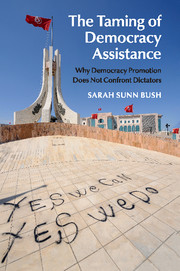Book contents
- Frontmatter
- Contents
- List of figures
- List of tables
- Preface
- List of abbreviations
- Part I Introduction and argument
- Part II Testing the argument
- 4 Delegation and the allocation of democracy assistance
- 5 Changes in American grant-making
- 6 Creating the democracy establishment
- 7 Jordan: aid in the shadow of geopolitics
- 8 Tunisia: reform after revolution
- Part III Conclusions
- Part IV Appendices and references
8 - Tunisia: reform after revolution
from Part II - Testing the argument
Published online by Cambridge University Press: 05 May 2015
- Frontmatter
- Contents
- List of figures
- List of tables
- Preface
- List of abbreviations
- Part I Introduction and argument
- Part II Testing the argument
- 4 Delegation and the allocation of democracy assistance
- 5 Changes in American grant-making
- 6 Creating the democracy establishment
- 7 Jordan: aid in the shadow of geopolitics
- 8 Tunisia: reform after revolution
- Part III Conclusions
- Part IV Appendices and references
Summary
May we dare dream? But then, doesn't every reality start as a dream?
“Should the people one day truly aspire to life, then fate must respond!”
Tunisia inspired mass uprisings throughout the Arab world after popular protests forced its long-standing dictator, Zine El Abidine Ben Ali, to step down on January 14, 2011. Tunisians had long resisted and contended with Ben Ali's tyranny. But like other revolutions, their successful uprising – against one of the world's most repressive dictators – took most observers by surprise. Its immediate catalyst was the public suicide of a fruit vendor, Mohamed Bouazizi, who set himself on fire on December 17, 2010, to protest the corrupt police in his town; the police had allegedly harassed Bouazizi, flipping over his fruit cart and confiscating his fruit-weighing scales. Bouazizi's self-immolation served as a lodestar for a young population fed up with the government's corruption, bad economic policies, and repression. It prompted protests across the country that brushed aside Ben Ali – Tunisia's president since 1987 – within less than a month. Ben Ali and his wife managed to escape, flying to Saudi Arabia after France turned them away.
The main goal of this chapter is to evaluate the extent to which the theory presented in Chapter 2 explains democracy assistance after Ben Ali. To complement the analysis presented in Chapter 7, I focus primarily on the professionalization hypotheses, drawing on twenty-five field-based interviews, organizations’ documents, news articles, and secondary research. The first step is to evaluate the values of the key variables. The chapter thus explores variation over time in democracy assistance in Tunisia, comparing the immediate post-revolution period to dynamics eighteen months later. One of the advantages of this longitudinal approach is that it holds constant potentially confounding factors – such as the strategic importance and regime type of the target country – and thus allows me to focus on my key variables of interest. Table 8.1 previews the findings.
- Type
- Chapter
- Information
- The Taming of Democracy AssistanceWhy Democracy Promotion Does Not Confront Dictators, pp. 187 - 208Publisher: Cambridge University PressPrint publication year: 2015



